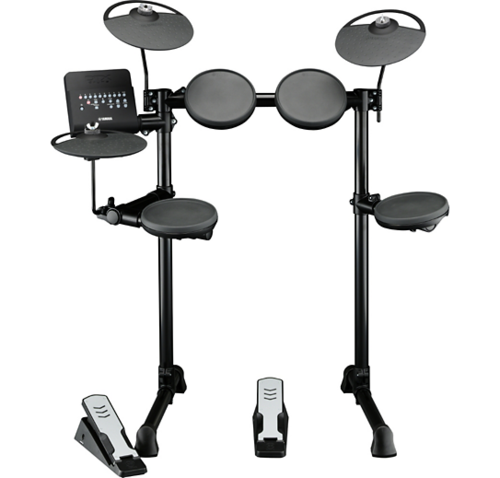Should I Buy Acoustic or Electronic Drums?
by Justin Boden
Mickey Hart, one of the original drummers of the legendary band Grateful Dead, once said “Life is about rhythm. We vibrate, our hearts are pumping blood, we are rhythm machines. That’s what we are.” He’s right - try to go one entire day without tapping your pen to a self-manifested beat, or turning your car’s steering wheel and console into the greatest drum kit you didn’t know you owned. Music or not, your body keeps you reminded that we are creatures of rhythm. It makes sense then why it looks like so much fun to play the drums to even the least musically inclined because it absolutely is!
Buying drums for the first time can seem a little tricky particularly when considering whether to go with an electronic drum kit or a traditional acoustic kit. Surely there are positive and negative points to each? Which is better? Do electronic drums sound like real drums? Which set-up is best for me?
The answer to all of these is “it depends”. Your living situation, what you want to achieve and even the type of music you want to play all matter greatly. So which type of kit is best for you; acoustic drums or electronic drums? Let’s break them out.
Acoustic Drums
It’s amazing what a little wood, a bit of metal and some “skins” can do when put together. The traditional drum “kit” we see today has been around since the 1920’s rise of jazz music during prohibition but had been steadily evolving from simple military snares and bass drums, similar to what you see and hear in today’s parades, since the 1860’s. Generally, your standard kit will include a bass drum, snare drum, one or two tom-toms and some cymbals all meant to be played together as one instrument.
When you think of drumming it’s difficult not to picture a traditional set like this loudly played and filling entire rooms with sound, which happens to be the acoustic drums double-edged sword. They are loud!
This works great for live bands, which need bombastic beats to fill out against just as loud or (if they have their way), even louder electric guitars and bass. But if you live in an apartment, have roommates or like your neighbors, acoustic drums may be impossible to own and play regularly since it’s difficult to play them quietly, even with things like drum silencer pads.
Have ambition of playing in a live band? Does being the next Dave Grohl or making a career out of drumming sound like your route? Chances are you’re going to own an acoustic kit then. While the sounds of an electronic kit are much better today, the natural tone and control of an acoustic set are still tough to beat despite the great advances in replicating these throughout the years. The ability to fully control the sound dynamics (softer or louder hits) and where they hit only adds to the benefits as the responsiveness of an actual drum causes the stick to rebound and bounce back fully and more realistically than the rubber pads of an electronic kit. Both dynamics and shot control give a better feel for the player as they play helping, especially beginners, by forcing technique with the need to hone accuracy.
So besides being loud everything else is better? Well, not exactly. Acoustic drums generally will take up more space. They also need to be tuned, require more general maintenance, are tougher to lug around from location to location, cannot play as many overall sounds and can reach astounding prices for high-quality gear making the choice less clear-cut. Not to mention that technology has grown leaps and bounds over the last 20 years making electronic drums closer counterparts to acoustic drums than they’ve ever previously been. Maybe an electronic kit is better for you?
Electronic Drums
It wasn’t until the 1970’s that commercial electronic drum kits began appearing for consumers so it makes sense that many of the earliest kits were less refined in tone, feel and responsiveness. Leading to a bad taste in the mouths of drummers looking into electronic kits that still to this day sometimes lingers. Technology has done the drumming world a favor though and today’s electronic kits are versatile, accurate and sounding better than ever making the choice between acoustic and electronic far less cut and dry.
Electronic drums are an asset to those wanting to play the drums but have roommates or live in an apartment. While they aren’t 100 percent silent, since you’re still striking a rubber pad, electronic drums with headphones turn into near silent slayers allowing you to rock late into the night without the police at your door with noise complaints, something elusive to acoustic drummers in even the coolest of neighborhoods. Due to their electronic capabilities it’s also extremely easy to change the sounds that come from each pad, so say the first song you want to learn is a booming electronic song full of low-end bass hits, but your second song is a lo-fi 90’s grunge song requiring an entirely different sound set - you can quickly switch between the two types of music without additional gear by simply selecting the different MIDI sounds. It's as easy as that.
If space is a problem, electronic drums usually take up less space as their pads are much smaller than traditional drums. There’s also little or no maintenance to be done such as tuning or reskinning your drums making them great for the beginner drummer who may become overwhelmed with the idea of tuning their set.
Electronic kits aren’t without their flaws though. Beginner drummers who learn on an electronic kit tend to have more flaws in their technique than the acoustic drummer. This is because, as previously mentioned, the rebound and responsiveness just aren’t the same causing players to handle stick rebound differently which could hurt them as a player especially if they practice at home on an electronic set but then go play on an acoustic set for lessons or live performances.
Ultimately this choice often comes down to simply what type of living situation you’re currently in, and whether you're more of an old time rock n' roll or strive to hit the electronic genre sticks. Today’s market and tech have brought them closer than ever before making it a tough decision.
If you want to dabble and casually see if the drums are a great fit, play only electronic music or live in a limited living environment an electronic drum kit is probably the best route for you. However, if you have plans of being in a live band, possibly want to make it a career, only want to play rock and other guitar-oriented styles, or have no interest in electronic music it’s likely that an acoustic drum kit is the best choice for you.




